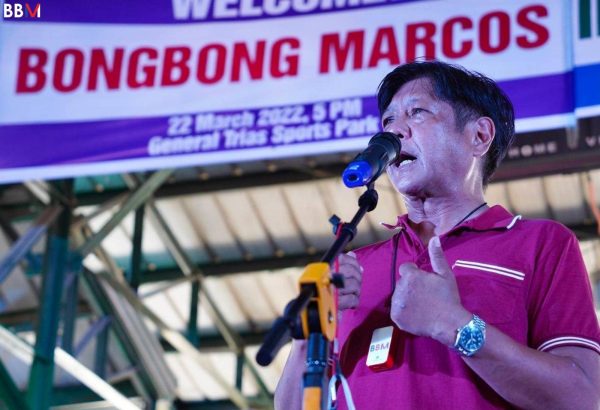
On Monday, the Philippine presidential frontrunner Ferdinand “Bongbong” Marcos Jr. was buoyed after he received an endorsement from the political party of President Rodrigo Duterte.
Marcos was the candidate “whose platform is most aligned with the development program of President Rodrigo Roa Duterte,” stated a resolution released by the faction of the PDP-Laban party supported by the Philippine leader. Marcos, the son and namesake of the dictator who governed and pillaged the Philippines for two decades prior to 1986, is running for president alongside Duterte’s daughter, Sara Duterte-Carpio, who is currently the mayor of Davao City.
The endorsement follows a period of confusion within PDP-Laban, which has split between factions aligned with Duterte and the boxing star Manny Pacquiao, who is also running in the presidential race. Duterte’s wing of PDP-Laban, known as the “Cusi faction,” named after Alfonso Cusi, currently Duterte’s Secretary of Energy, was left without a standard-bearer in the race after Senator Christopher “Bong” Go, a former aide of Duterte, pulled out in November.
Since then, there has been some speculation about who, if anyone, Duterte would endorse in the race. He has already endorsed his daughter’s vice presidential candidacy, but remained silent about his preferred successor as president. Moreover, recent cryptic comments from the Philippine leader, and disparaging remarks that he has directed in Marcos’ direction, have given rise to suggestions that he might issue a left-field endorsement of some kind.
Earlier this month, Duterte announced that he wanted a “compassionate” person, preferably a lawyer, to be the next president. Of the 10 candidates vying in the May elections, only Jose Montemayor Jr. and Vice President Leni Robredo, a staunch critic of Duterte, are lawyers.
As such, the PDP-Laban declaration might be about as close as Marcos gets to a presidential endorsement. Assuming that Duterte does not do something unpredictable between now and May 9, the Cusi faction’s endorsement will no doubt strengthen the Marcos campaign and help it maintain its healthy lead in the polls. A Pulse Asia Research survey conducted in January reported that 60 percent of respondents would vote for Marcos for president, with only 16 percent choosing his closest opponent, current Vice-President Leni Robredo.
Critics of Marcos claim that this lead has been created in part by a sophisticated social media strategy that blurs the lines between fact and political fiction. This week, an article by AFP accused his campaign of engineering a “massive misinformation campaign aimed at revamping the family brand and smearing his top rival” Leni Robredo. In particular, this social media misinformation is aimed at portraying his father’s two-decade rule as a lost golden age of stability and prosperity, paving the way to the family’s return to Malacañang.
The significant lead also appears to explain his reluctance to give media interviews or to take part in televised election debates. On February 27, the 64-year-old politician refused to join nine other presidential candidates in a debate sponsored by CNN Philippines, due to his “busy schedule.” He similarly declined to attend a presidential debate hosted by the Commission on Elections (Comelec) on March 17, during which he was represented by an empty podium. The most likely explanation is that his lead is large enough that he has more to lose by participating than by refusing to subject himself to scrutiny.
As Fatima Gaw, an assistant professor at the University of the Philippines Diliman who researches digital platforms noted this week, “The reason why Bongbong Marcos Jr. has the audacity to ask voters to do research (‘magsiyasat’) is because he has built an alternative information ecosystem that supports, affirms, and legitimizes the political reality that fits his campaign narrative.”
Marcos Jr. Receives Electoral Endorsement From President Duterte’s Party
Source: Frappler

0 Comments